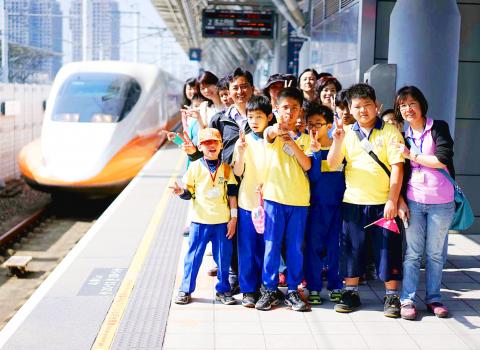As the Taiwan High Speed Rail Corp (THSRC) continues to struggle with years of accumulated losses, the Control Yuan has proposed making up part of the difference by canceling discounts for foreigners who are disabled, elderly or aged under 12.
Chien Lin Hui-chun (錢林慧君), a member of the government’s highest supervisory body, questioned the wisdom of extending the discounts enjoyed by Taiwanese to foreigners on the 345km railway, the beneficiary of government investments and subsidies.
She said that concession tickets sold to foreigners since 2009 have cost the THSRC NT$199 million (US$6.59 million).

Photo courtesy of the Taiwan High Speed Rail Corp
The operator of the railway, which opened in 2007, had accumulated NT$53.5 billion in losses as of January, despite having started to turn a profit in 2011.
The THSRC offers the same discounts to foreigners as it does to Taiwanese: half-price tickets for the mentally or physically disabled, senior citizens and children under 12.
Chien Lin’s report called for the policy to be reconsidered, saying it takes advantage of subsidies from Taiwanese taxpayers, though the report did not make any suggestions for policies on foreign nationals who legally reside, work and pay taxes in Taiwan.
The Control Yuan member also cited canceling the discounts out of the “spirit of equality and reciprocity,” saying that mass transit systems in other countries, such as Japan, Hong Kong and the UK, “do not have preferential treatment for our nationals.”
According to her report, the THSRC has previously defended its policy as a way to boost the nation’s reputation for friendliness and attract more foreign visitors.
Chien Lin’s report said in a separate section that legally mandated concession tickets on regular trains — for Taiwanese and foreigners alike — have caused the Taiwan Railways Administration losses of about NT$4.09 billion.
The Ministry of Transportation and Communications has not subsidized the rail authority’s burden as it is required to, Chien Lin said.

A strong continental cold air mass is to bring pollutants to Taiwan from tomorrow, the Ministry of Environment said today, as it issued an “orange” air quality alert for most of the country. All of Taiwan except for Hualien and Taitung counties is to be under an “orange” air quality alert tomorrow, indicating air quality that is unhealthy for sensitive groups. In China, areas from Shandong to Shanghai have been enveloped in haze since Saturday, the ministry said in a news release. Yesterday, hourly concentrations of PM2.5 in these areas ranged from 65 to 160 micrograms per cubic meter (mg/m³), and pollutants were

Taiwan’s armed forces have established response protocols for a wide range of sudden contingencies, including the “Wan Chun Plan” to protect the head of state, the Ministry of Defense (MND) said today. After US President Donald Trump on Saturday launched a series of airstrikes in Venezuela and kidnapped Venezuelan President Nicolas Maduro, concerns have been raised as to whether China would launch a similar “decapitation strike” on Taiwan. The armed forces regularly coordinate with relevant agencies and practice drills to ensure preparedness for a wide range of scenarios, Vice Minister of National Defense Hsu Szu-chien (徐斯儉) told reporters before a

EVA Airways on Saturday said that it had suspended a pilot and opened an investigation after he allegedly lost his temper and punched the first officer several times as their plane was taxiing before takeoff at Los Angeles International Airport. According to a report published on Thursday by The Reporter, the incident occurred after the flight’s Malaysian first officer tried to warn the Taiwanese pilot, surnamed Wen (文), that he was taxiing faster than the speed limit of 30 knots (55.6kph). After alerting the pilot several times without response, the first officer manually applied the brakes in accordance with standard operating

Japanese Councilor Hei Seki (石平) on Wednesday said that he plans to visit Taiwan, saying that would “prove that Taiwan is an independent country and does not belong to China.” Seki, a member of the Japan Innovation Party, was born in Chengdu in China’s Sichuan Province and became a naturalized Japanese in 2007. He was elected to the House of Concilors last year. His views on the Chinese Communist Party (CCP) — espoused in a series of books on politics and history — prompted Beijing to sanction him, including barring Seki from traveling to China. Seki wrote on X that he intends